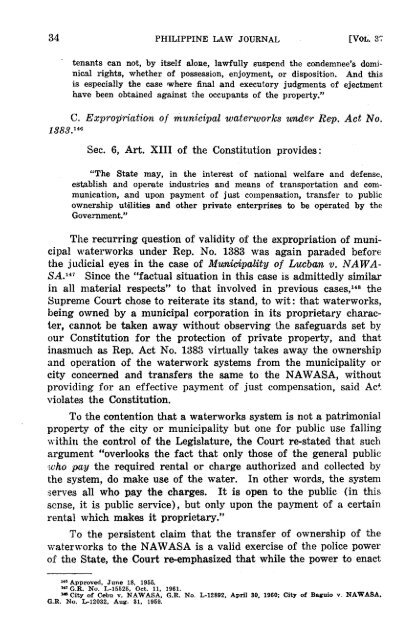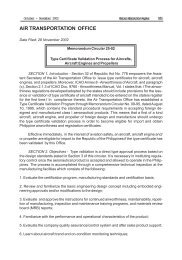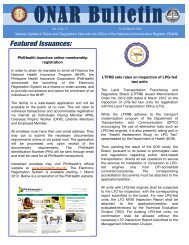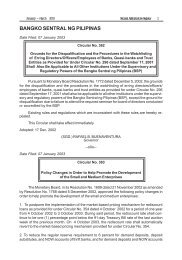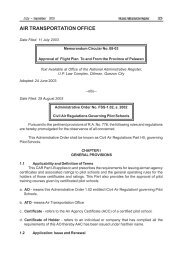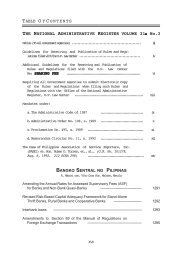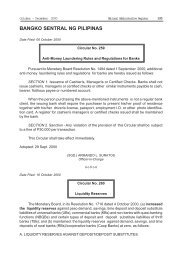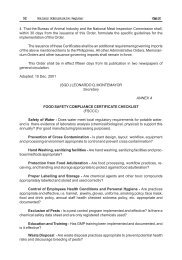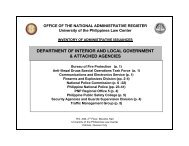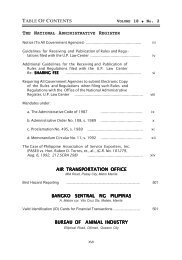PLJ volume 37 number 1 -01- Deogracias Eufemio
PLJ volume 37 number 1 -01- Deogracias Eufemio
PLJ volume 37 number 1 -01- Deogracias Eufemio
You also want an ePaper? Increase the reach of your titles
YUMPU automatically turns print PDFs into web optimized ePapers that Google loves.
1383. 146<br />
tenants can not, by itself aloJle, lawfully ,suspend the coondemnee's dominical<br />
rights, whether of possession, enjoyment, or disposition. And this<br />
is especially the case rwhere final and executory judgments of ejectment<br />
have been obtained against tJJ.e occup,ants of the property."<br />
C. Exprop'riation of municipal waterworks under Rep. Act No.<br />
"The State may, in the interest of national welfare and defense,<br />
establish and opemte industries and means of transportation and communication,<br />
and upon payment of just compensation, transfer to public<br />
ownership ut.ilities and other private enterprises to be operated by the<br />
Government."<br />
The recurring question of validity of the expropriation of municipal<br />
waterworks under Rep. No. 1383 was again paraded before<br />
the judicial eyes in the case of Mu,nicipality of Lucban v. NAWA-<br />
SA.147 Since the "factual situation in this case is admittedly similar<br />
in all material respects" to that involved in previous cases,14Sthe<br />
Supreme Court chose to reiterate its stand, to wit: that waterworks,<br />
being owned by a municipal corporation in its proprietary charact.er,<br />
cannot be taken away without observing the safeguards set by<br />
our Constitution for the protection of private property, and that<br />
inasmuch as Rep. Act No. 1383 virtually takes away the ownership<br />
and operation of the waterwork systems from the municipality or<br />
city concerned and transfers the same to the NAWASA, without<br />
providing for an effective payment of just compensation, said Act;<br />
violates the Constitution.<br />
To the contention that a waterworks system is not a patrimonial<br />
property of the city or municipality but one for public use falling<br />
within the control of the Legislature, the Court re-stated that such<br />
argument "overlooks the fact that only those of the general public<br />
1J.;ho pay the required rental or charge authorized and collected by<br />
the system, do make use of the water. In other words, the system<br />
serves all who pay the charges. It is open to the public (in this<br />
sense, it is public service), but only upon the payment of a certain<br />
rental which makes it proprietary."<br />
To the persistent claim that the transfer of ownership of the<br />
waterworks to the NAWASA is a valid exercise of the police power<br />
of the State, the Court re-emphasized that while the power to enact<br />
••• Approved, June 18, 1955.<br />
,•• G.R. No. L-15525, Oct. 11, 1961.<br />
••• City of Cebu v. NAWASA, G.R. No. L-12892, April 30. 1960; City of B&~uio v. NAWASA.<br />
G.R. No. L-12032, Aug. 31, 1959.


